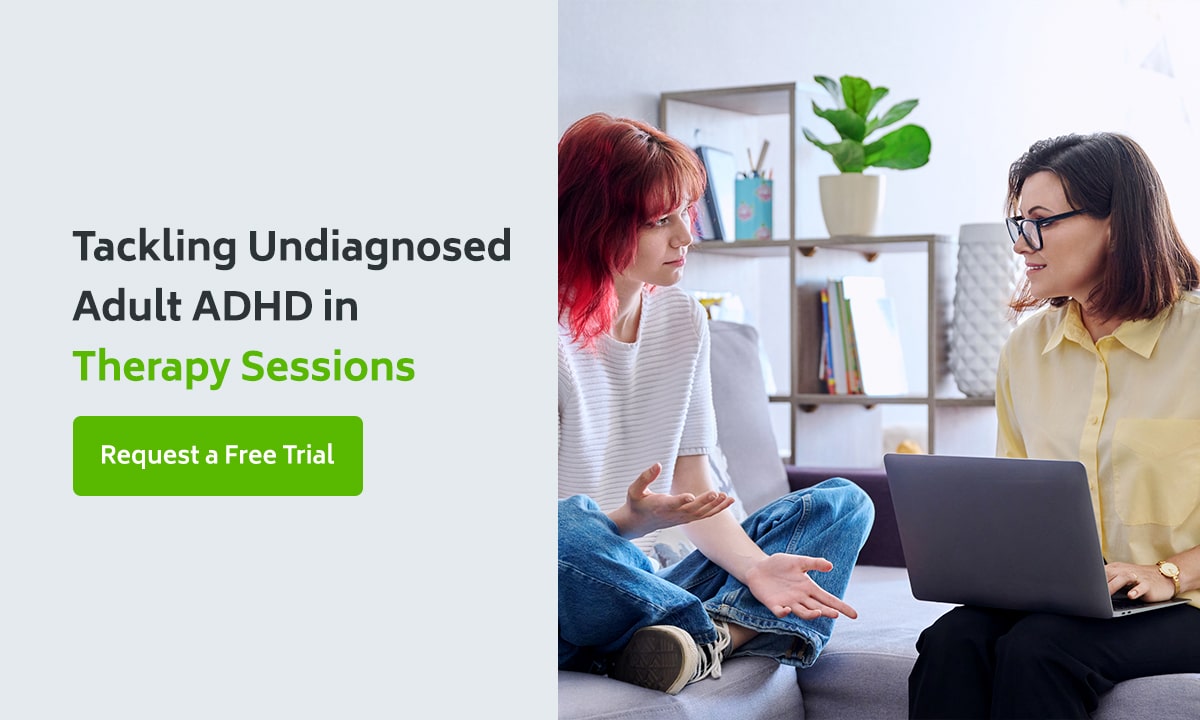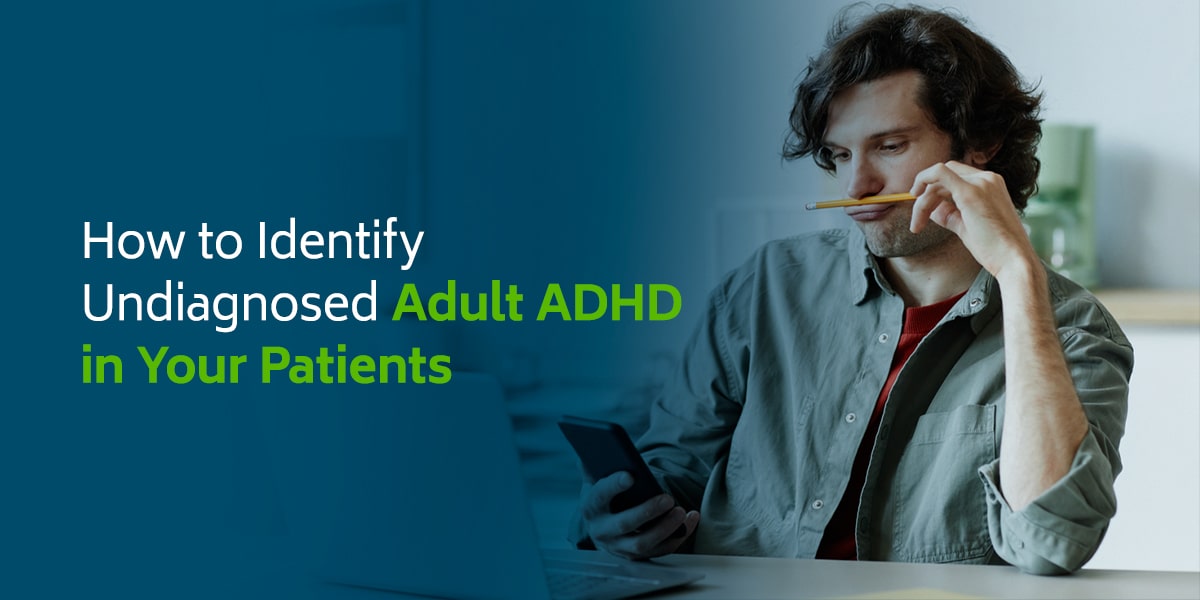
How to Identify Undiagnosed Adult ADHD in Your Patients
Many people misunderstand attention deficit hyperactivity disorder (ADHD), thinking of it as a childhood disorder that always presents with hyperactivity. ADHD is much more nuanced than that — especially if a patient reaches adulthood without a diagnosis. Decades of undiagnosed ADHD can cause the disorder to present in very different ways. Just as girls and boys show ADHD differently, so do adults and children.
As a clinician, you can help your patients avoid misdiagnoses and get the support they need by understanding these differences.
Symptoms of Undiagnosed ADHD in Adults
Children are often diagnosed with ADHD after showing disruptive symptoms during class or at home, such as an inability to remain still or a tendency to interrupt others. While adults can certainly be fidgety or have trouble holding their tongues, hyperactive symptoms aren't always apparent. They may instead display signs of disorganization, executive functioning problems and other symptoms that grow more prevalent in adulthood. Many adults have developed coping tools to minimize their symptoms over the years.
Diagnosing ADHD in adults calls for a keen eye. Many factors — including age, gender and co-occurring disorders like depression and anxiety — influence how adult ADHD symptoms manifest. Adult ADHD can be the inattentive, hyperactive or combined type, just as it is with kids.
Below are some common signs of untreated ADHD in adults.
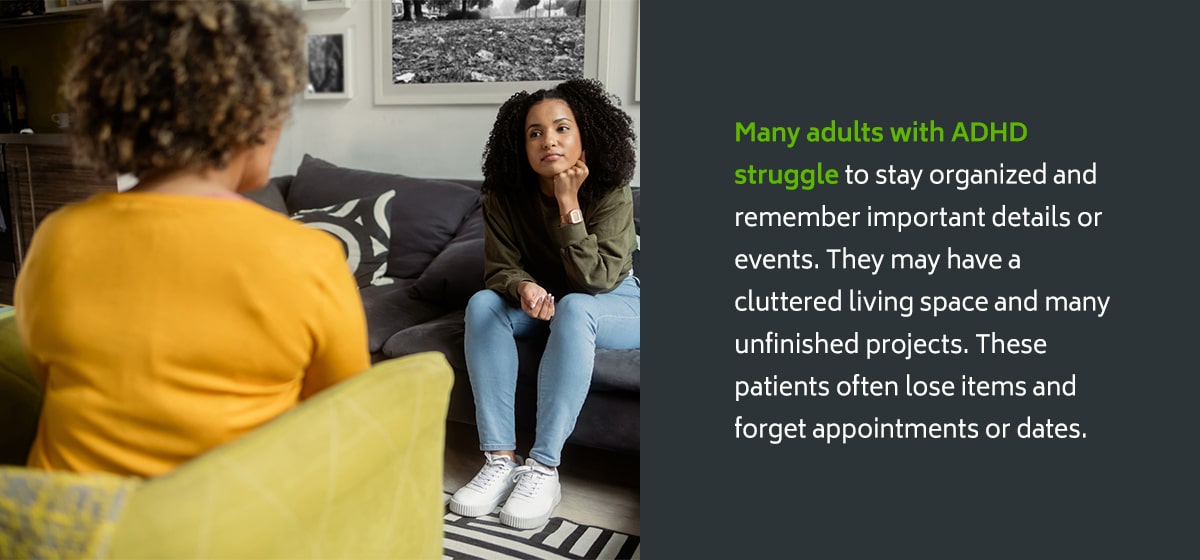
1. Disorganization and Forgetfulness
Many adults with ADHD struggle to stay organized and remember important details or events. They may have a cluttered living space and many unfinished projects. These patients often lose items and forget appointments or dates. They may not even realize anything is amiss until someone else brings up whatever it is they forgot.
These symptoms can be a significant source of conflict for friends, family members and coworkers, who may see them as a sign that the patient doesn't care or won't take responsibility.
2. Trouble Focusing
Trouble focusing is a hallmark symptom of ADHD. Slogging through a boring or repetitive task can feel unbearable, leading to difficulties with everyday tasks like daily chores and work assignments. Activities that don't have an immediate payoff, such as learning how to play an instrument, can also be challenging.
Another symptom that can affect an adult with ADHD is periods of hyperfocus. They might become so engrossed in something that they neglect other responsibilities.
3. Restlessness
Just like kids, many adults with ADHD struggle to sit still. While they might not have the outbursts and fidgeting that many kids do, restlessness from undiagnosed ADHD in adults can show up as an inability to relax. Adults might feel more tense and anxious, which can contribute to symptoms of anxiety and even misdiagnoses.
4. Low Motivation and Fatigue
Problems with executive functioning can affect the motivation of an adult with ADHD. They often struggle to start or switch tasks and may feel overwhelmed with the number of decisions required or steps involved. Without an easy starting point, it becomes hard to get started. They may also struggle with organizing large projects into more manageable pieces.
While someone without ADHD might work on a project for an hour a day, someone with ADHD may feel that they need an entire day to do the project from start to finish, making it harder to squeeze it into their schedule. “Switching gears” takes a long time for them, so short periods of work may not be very effective, anyway.
Fatigue is also a common adult ADHD symptom, especially for people who mask their ADHD to suppress symptoms and behave more like they do not have ADHD. It can take a toll and lead to burnout and tiredness.
Problems with low motivation and fatigue can dramatically impact a person with ADHD's productivity. It might be hard for them to keep up at work or keep their house clean, leading to other effects like work performance and relationship problems.
5. Time Management Problems
Many people with ADHD also have a symptom called time blindness, which makes it difficult to sense the passage of time. Understandably, time blindness can contribute to being chronically late, losing track of time and feeling like time is moving too slowly. Adults with ADHD could struggle to create an accurate estimate of how long a task will take, and they might not be able to effectively map out when certain tasks should get done.
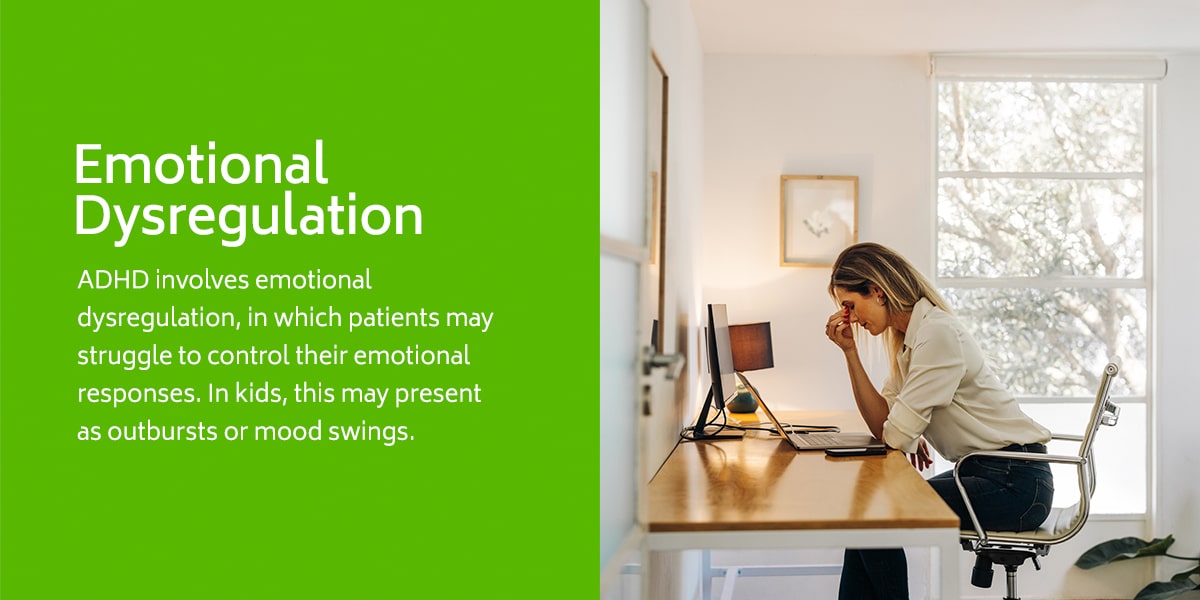
6. Emotional Dysregulation
ADHD involves emotional dysregulation, in which patients may struggle to control their emotional responses. In kids, this may present as outbursts or mood swings. While these can show up in adults, too, an adult with ADHD might be more likely to get frustrated quickly or struggle to calm down when upset. It's sometimes difficult for them to focus on anything besides their emotions, making their responses unpredictable.
If a clinician doesn't consider ADHD, these responses can contribute to thinking the patient has a different disorder, like bipolar disorder or anxiety.
7. Impulsivity
Impulsivity is often easier to spot in children. It could look like having outbursts, interrupting conversations and seeking attention from adults. In adults with untreated ADHD, impulsivity usually takes other forms, many of which overlap with addictive behaviors and can be damaging.
Some examples of impulsive behaviors include:
- Excessive shopping
- Substance abuse
- Sexual promiscuity
- Binge eating
- Frequently quitting and starting new jobs
- Quickly entering and exiting relationships
- Gambling
An ADHD diagnosis can be critical in treating these problems effectively and avoiding adverse effects.
8. Indecisiveness
Lastly, people with ADHD often wrestle with indecision. They may focus on every possible outcome and worry about making the wrong choice or feel overwhelmed by the options. For larger decisions, adult ADHD can make it hard for patients to focus long enough to collect information and make decisions.
Adults with ADHD might start to avoid making decisions, instead making choices at random or asking others to make choices for them.
Download our Behavioral Health Assessment Guide
Find out which assessments are valid, research-verified, and completely free to use. A complete list of anxiety assessments available in the public domain is included in our guide.
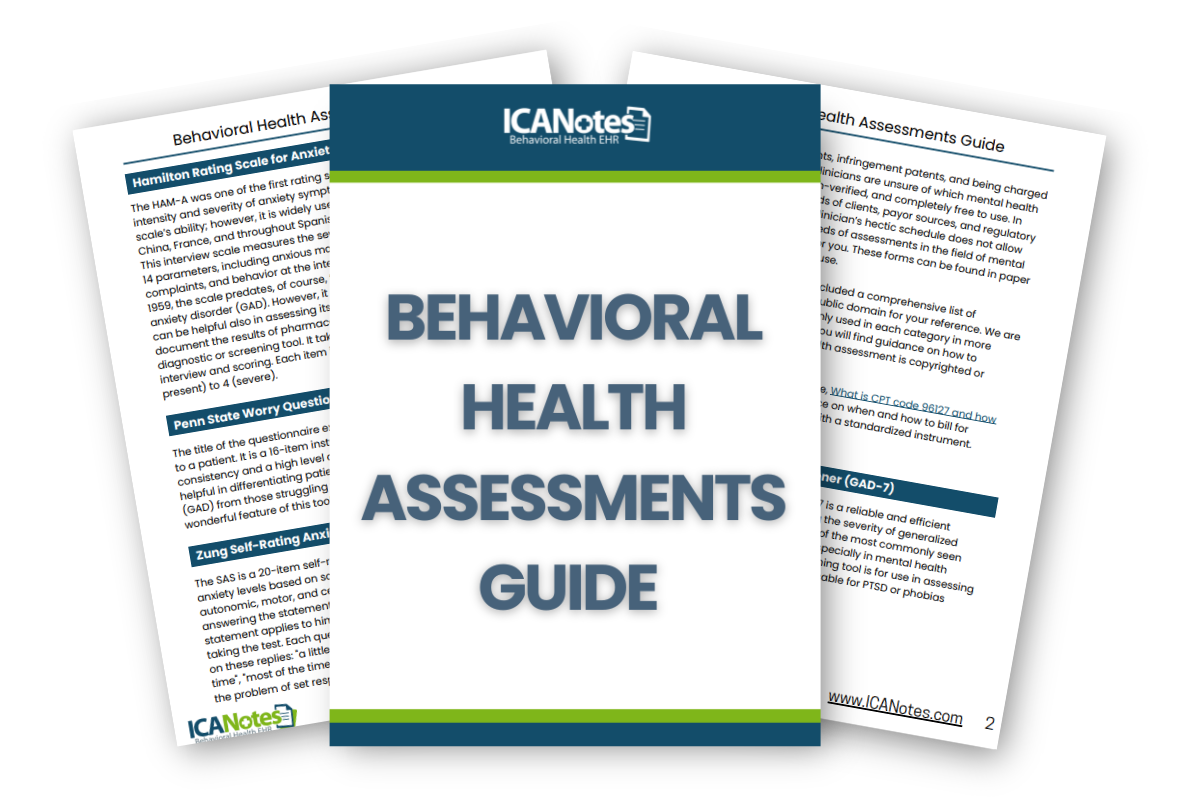
Effects of Undiagnosed ADHD in Adults
Unsurprisingly, this long list of potential symptoms can affect many parts of a patient's life. An undiagnosed person has no clear answer as to why everyday tasks are so difficult for them. This disorder is pervasive, with symptoms that can affect everything from performance at work and relationships to the patient's sleep quality and self-image.
Some of the effects of undiagnosed adult ADHD may include:
- Challenges at work: The typical 9-to-5 workday is not conducive to many ADHD symptoms. They might be asked to sit still for long periods, focus on boring tasks, stay organized during complex projects and follow precise schedules. Some adults with ADHD end up quitting their jobs impulsively and may have a string of employers in a short timeframe. ADHD can also impact the likelihood of graduating and future job prospects.
- Relationship problems: Adult ADHD symptoms often cause conflict for couples, families, and friends. Poor time management and motivational skills might lead to housekeeping arguments, while forgetfulness can cause the patient's loved ones to feel neglected or ignored. Without understanding the role of ADHD, many people are quick to call the person with ADHD lazy or selfish. People with ADHD might even avoid social situations out of fear that they will become distracted, interrupt others or lose focus during conversations.
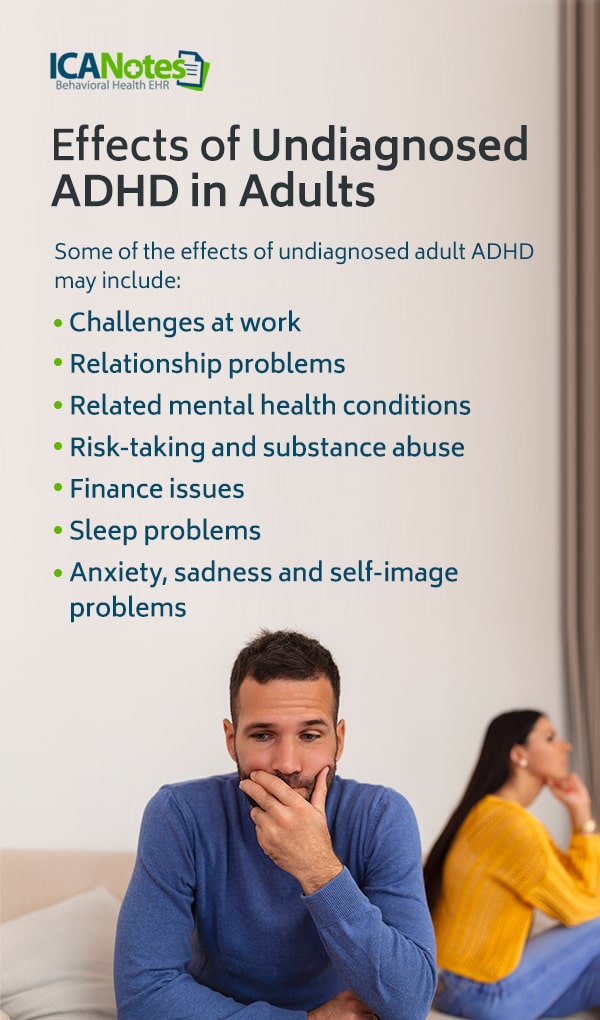
- Related mental health conditions: Nearly 80% of adults with ADHD have a comorbid behavioral health disorder, such as substance abuse, mood, or anxiety disorders. Undiagnosed ADHD can make managing these disorders more of a challenge, especially if the other disorder makes it harder to get an ADHD diagnosis or leads to a misdiagnosis. Someone with anxiety might understand the importance of tasks like getting regular exercise and making it to appointments on time, but their forgetfulness and time management difficulties could make it almost impossible to adhere to these goals.
- Risk-taking and substance abuse: Impulsivity and dopamine-seeking behavior sometimes lead to substance use. This coping mechanism might lead to dependence on drugs and alcohol, eating disorders, gambling, and other risky activities. ADHD is even associated with higher driving-related risks, such as accidents, violations, and revoked licenses.
- Finance issues: People with ADHD often struggle with finances. Impulsivity might make someone prone to spontaneity and poorly thought-out purchases, while resistance to time-consuming tasks can cause them to procrastinate in managing a budget. Forgetfulness can also contribute to problems with paying bills on time.
- Sleep problems: Untreated ADHD in adults often comes with sleep challenges, such as having racing thoughts at night, trouble getting out of bed, or insomnia from ADHD medications. Since sleep impacts many aspects of daily functioning, sleep problems can be a significant and recurring problem.
- Anxiety, sadness, and self-image problems: Adult ADHD can lead to emotional responses to everyday struggles. The individual might wonder what's wrong with them, why they're so lazy, or why they can't remember the things other people do. They can feel overwhelmed, frustrated, and exhausted with day-to-day difficulties — especially if they often mask their symptoms, leading to problems with self-esteem and self-image and emotional distress.
While a diagnosis doesn't solve all of these problems, it can provide answers and help the client start the path toward treatment. After all, organization and sleep tips often look much different for people with ADHD than for people without it. An adult ADHD diagnosis can open up doors for psychotherapy, medication, and work and school accommodations.
You Recognize the Symptoms -
What are the Next Steps?
Whether you're working with a new client intake or offering therapy for an existing client, you may notice the above signs of untreated ADHD in adults. Sometimes, these clients are completely unaware of the possibility of adult ADHD. As their clinician, you have an opportunity to initiate a larger discussion. Depending on your patient's existing knowledge, other providers, and their openness to an ADHD diagnosis, you may want to pursue the following actions:
1. Formal ADHD Testing
The first step would be to recommend testing for ADHD. Adult ADHD screening typically involves several assessments, such as behavior rating scales, symptom checklists, and even computerized tests that evaluate attention and inhibitory control. You might be able to administer these assessments yourself, or you may need to refer the patient to a provider trained in this area.
2. Patient Education
Many patients don't know much about adult ADHD or have a narrow understanding of it. They may picture someone with ADHD as a hyperactive child and not see how it could apply to them. You can help them expand their knowledge of the disorder. Explain the different types and how undiagnosed ADHD can present differently in adults. Some patients will have an “aha” moment during these discussions and relate to descriptions of ADHD thinking patterns.
During patient education, be sure to address any misconceptions or questions the patient may have. For instance, you might tell the patient that:
- Hyperactivity isn't always a symptom.
- ADHD can present differently in women and men.
- People with ADHD can have good grades and successful careers.
- Many people with ADHD do not “grow out of it” as they get older.
Patient education can also include self-help strategies that allow your client to start building their ADHD toolbox. You might discuss ADHD-friendly tactics for staying organized, reducing distractions, tackling big projects, and improving sleep hygiene.
3. Discussing Treatment Options
While many people are familiar with stimulant medications, modern ADHD treatment is multifactored, so inform your client of the different approaches they can take to manage their ADHD. Some areas to discuss include:
- Medication: Adults with ADHD now have several medication options. Stimulants include amphetamine- and methylphenidate-based medications like Adderall and Ritalin, but many other novel stimulants are also available. Non-stimulant medications can also help patients who do not want to or cannot take stimulants. Some antidepressants can help certain individuals manage adult ADHD symptoms or the symptoms of comorbid behavioral health disorders. A psychiatrist or other prescribing clinician will help find the right medication for the client.
- Psychotherapy: Often called the gold standard for ADHD psychotherapy, cognitive-behavioral therapy (CBT) can help many patients manage their disorder through psychoeducation, coping skills and adaptive thinking. Other popular psychotherapeutic approaches include mindfulness-based cognitive therapy (MBCT) and dialectical behavioral therapy (DBT). MBCT can be particularly helpful in managing emotional dysregulation.
- Mindfulness: Mindfulness activities, like meditation and breathing exercises, can help people with ADHD feel less reactive and more aligned with the present moment. Patients might improve their focus, executive functioning and emotional regulation. Patients can even perform many mindfulness activities on their own at home or with the help of apps.
4. Considering Comorbid Disorders
Perhaps you're already treating your patient for another disorder, or they started seeing you because they suspect one. Consider how an ADHD diagnosis affects this other disorder. Would ADHD better explain some of the patient's symptoms? Does an ADHD diagnosis affect your treatment plan for another condition? Evaluate the effects of ADHD on other disorders and vice versa. If your patient has an anxiety disorder, for example, you might prioritize addressing the emotional regulation symptoms of ADHD.
Tackling Undiagnosed Adult ADHD in Therapy Sessions
Identifying ADHD calls for a keen eye and good observation. As a therapist, you'll need detailed notes and a wealth of information, like assessment results and diagnoses from other providers. Your notes will be a crucial tool in both diagnosing and treating ADHD, but you shouldn't take too much time out of your day to write them. ICANotes is an electronic health record (EHR) designed for behavioral health providers and filled with features to support you and your clients with adult ADHD.
With robust charting tools, pre-configured templates, and an easy-to-use, click-based interface, ICANotes allows you to write comprehensive notes in just a few minutes. It also offers features for billing and practice management in a secure, compliant platform. Spend less time on administrative tasks and more time helping your clients manage their ADHD.
Start Your Free Trial

